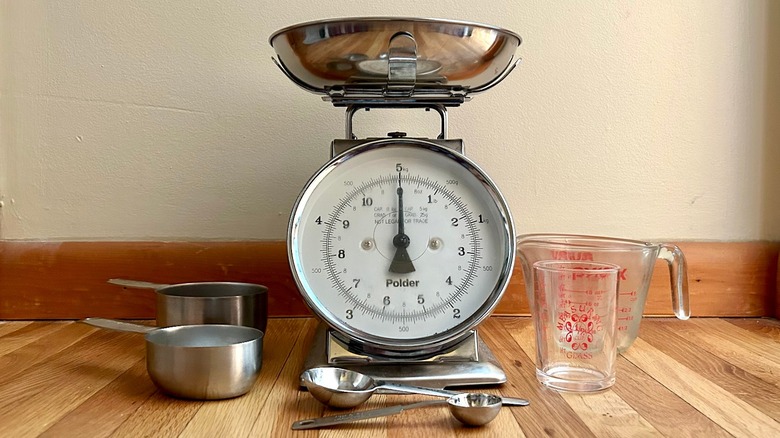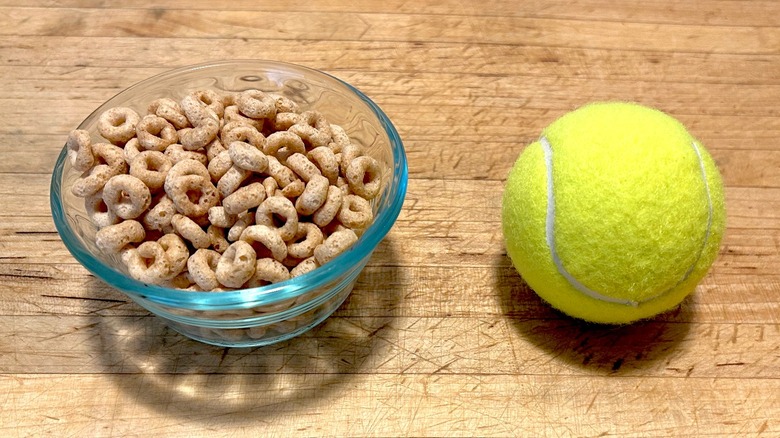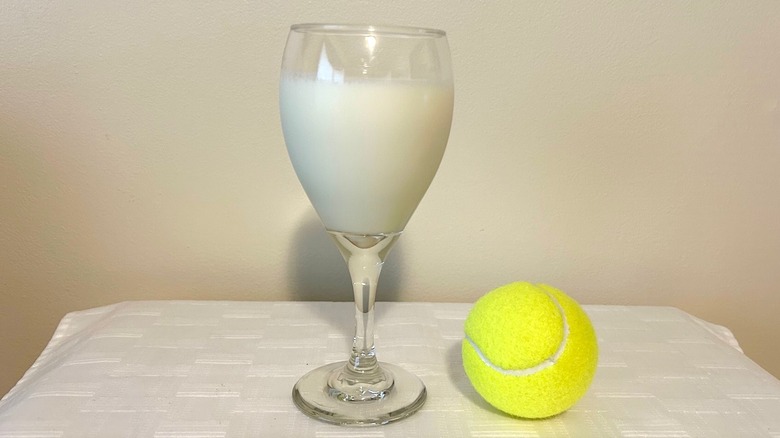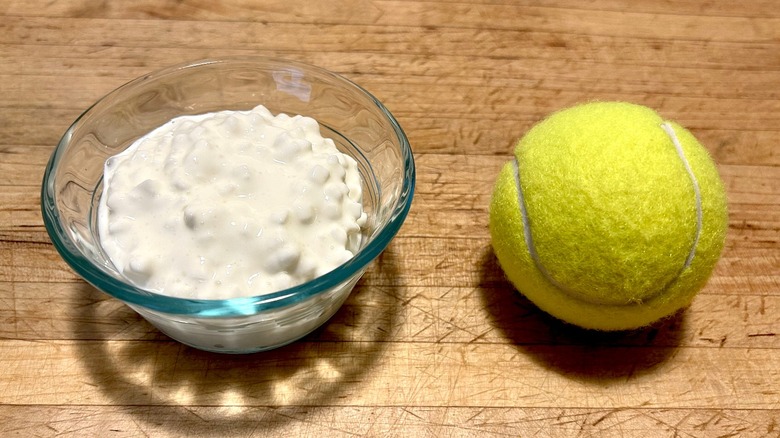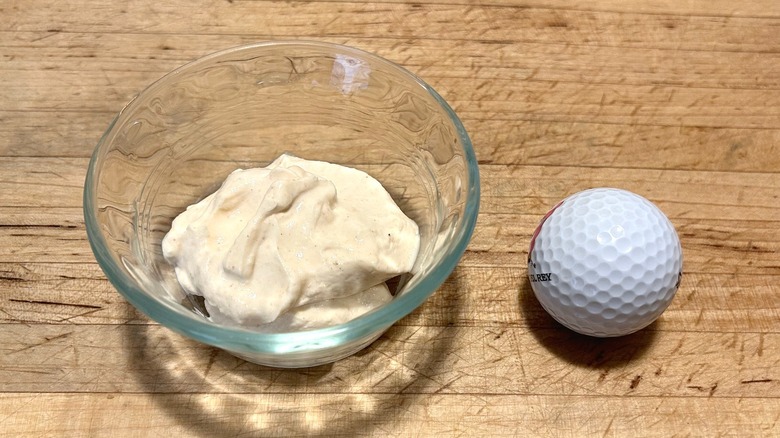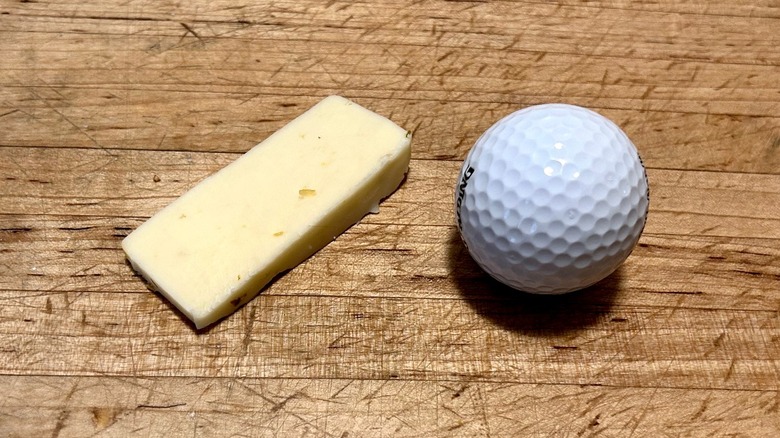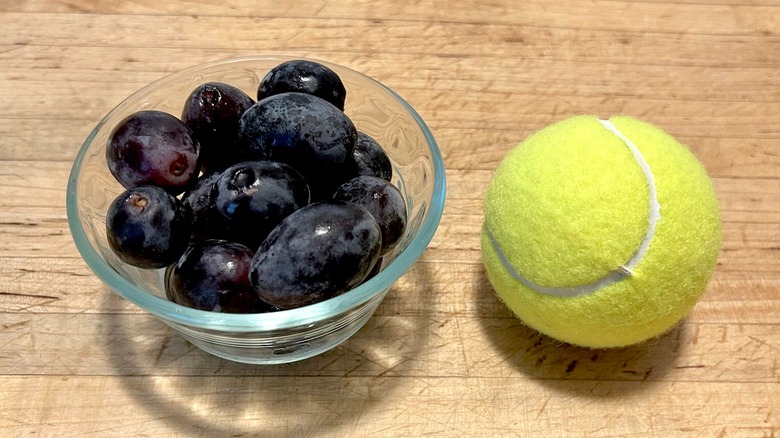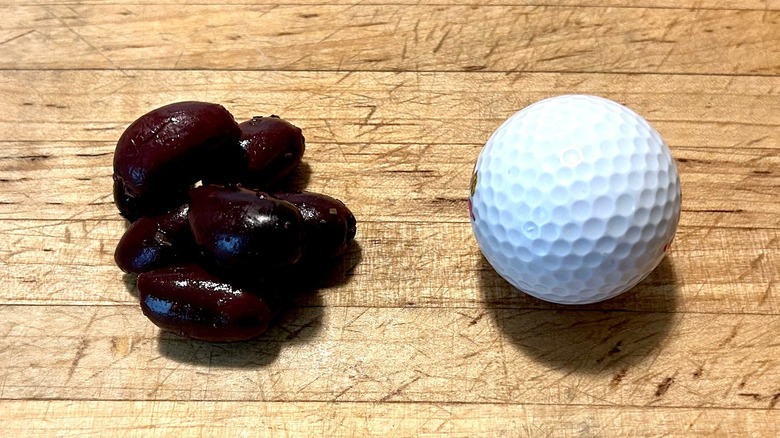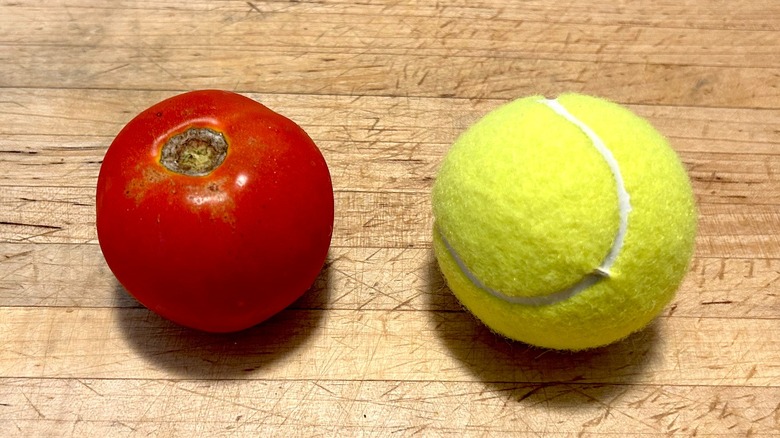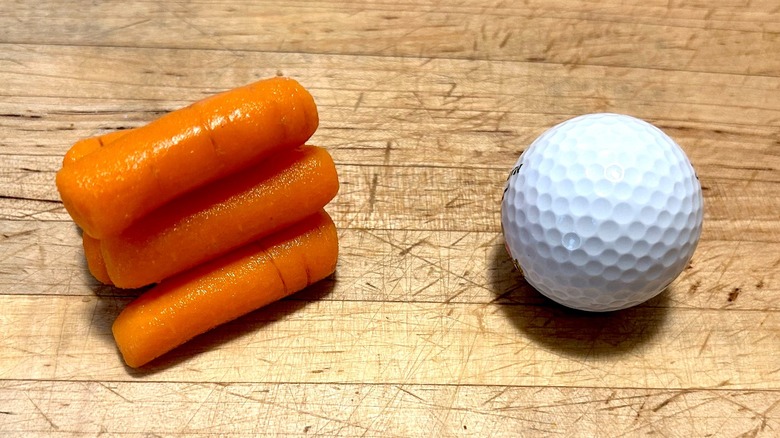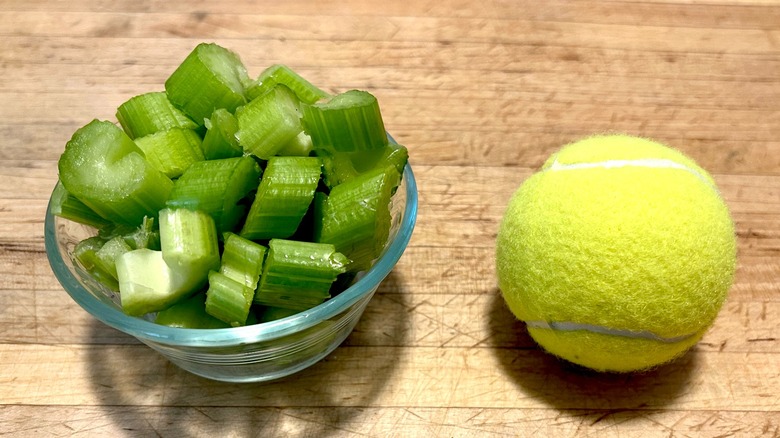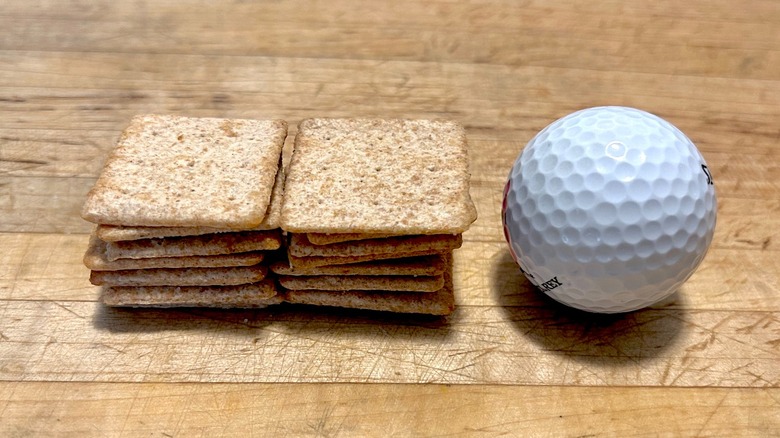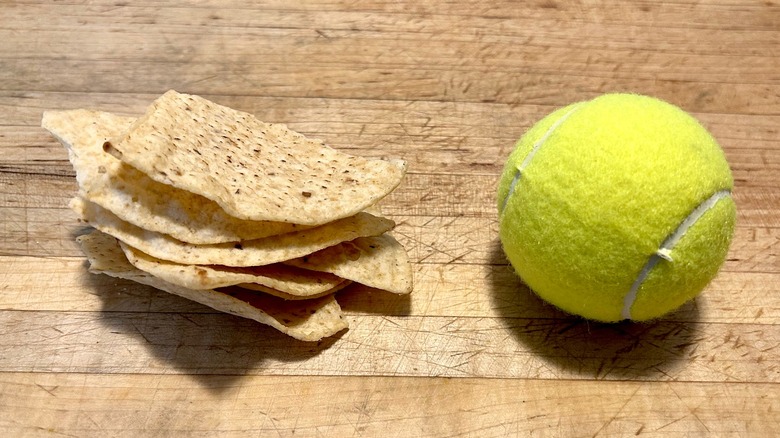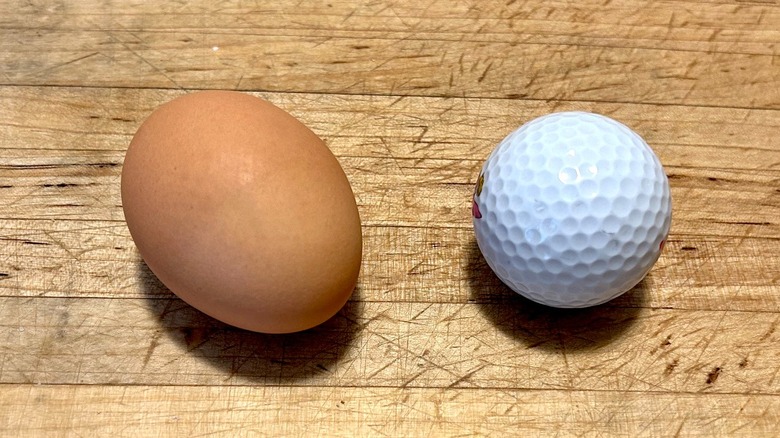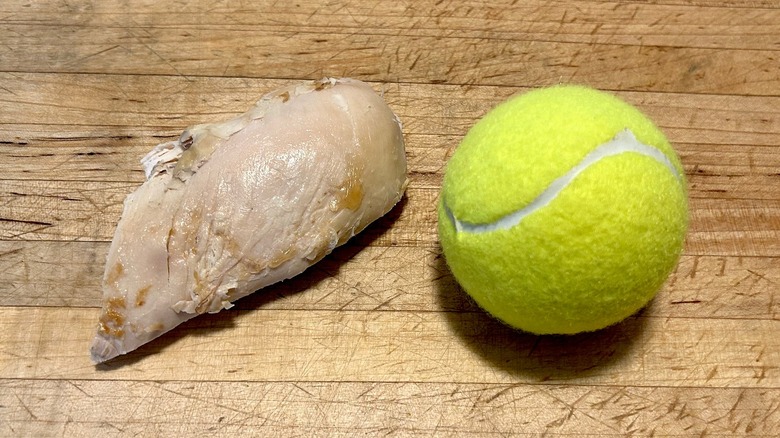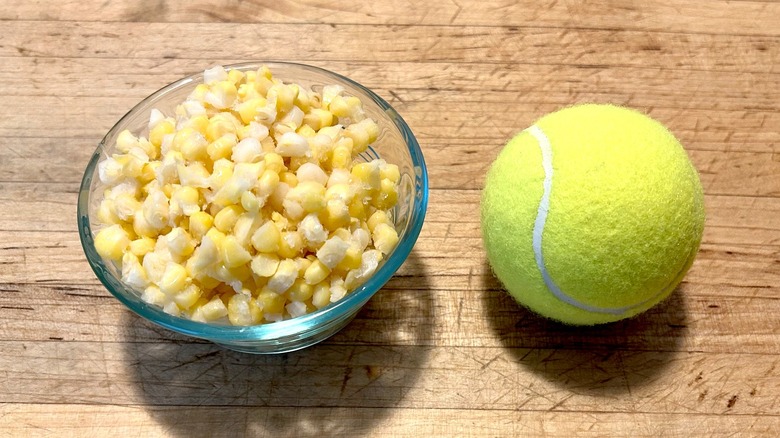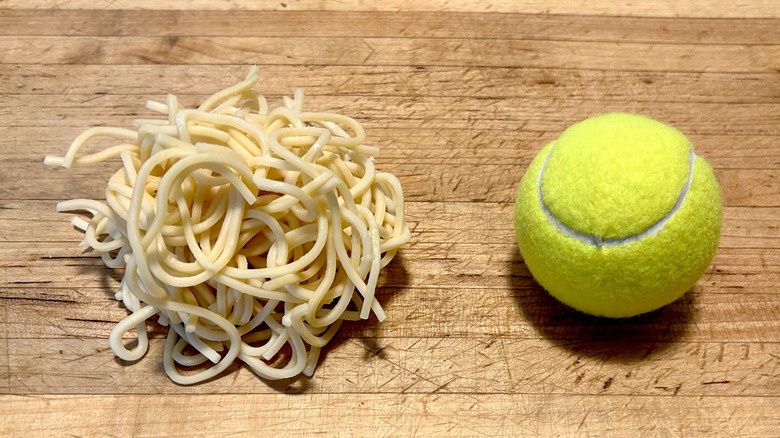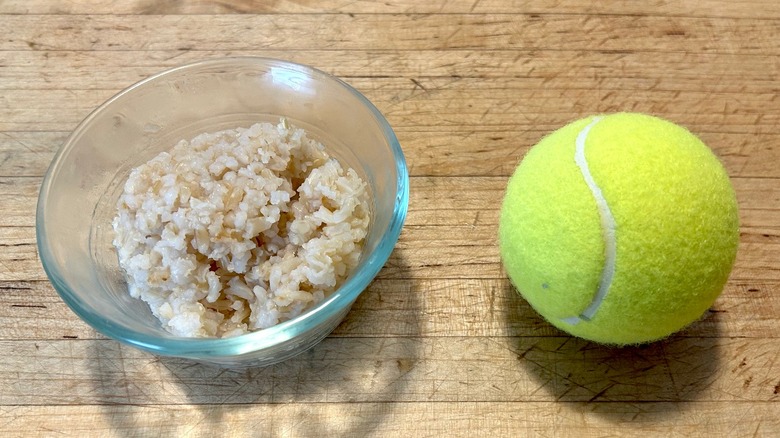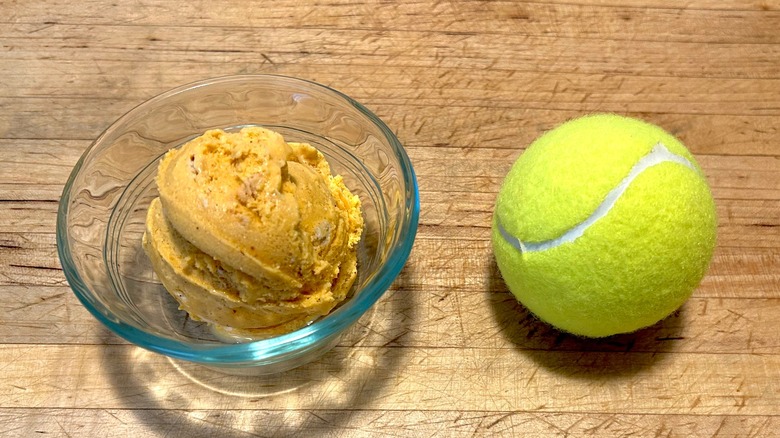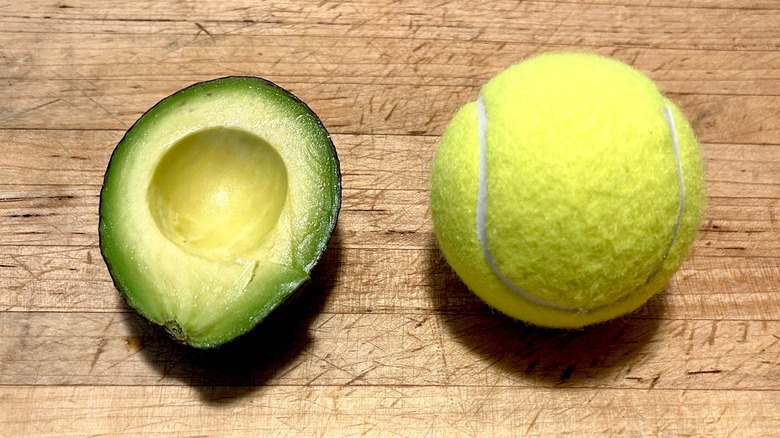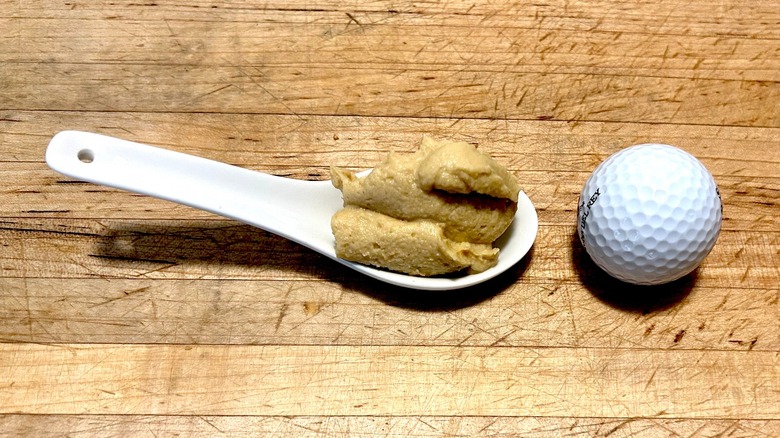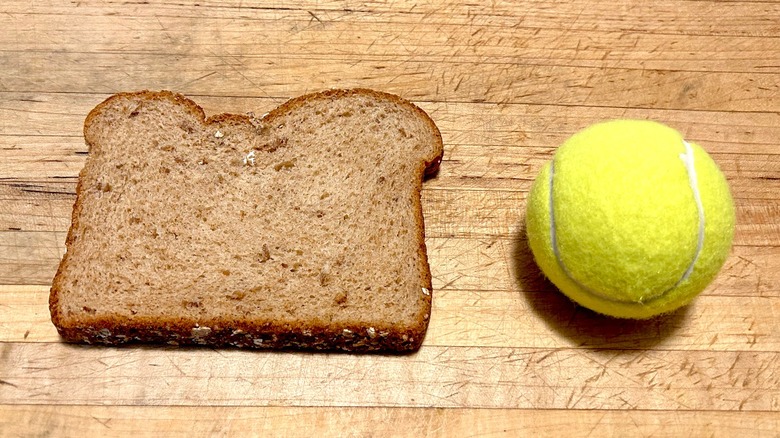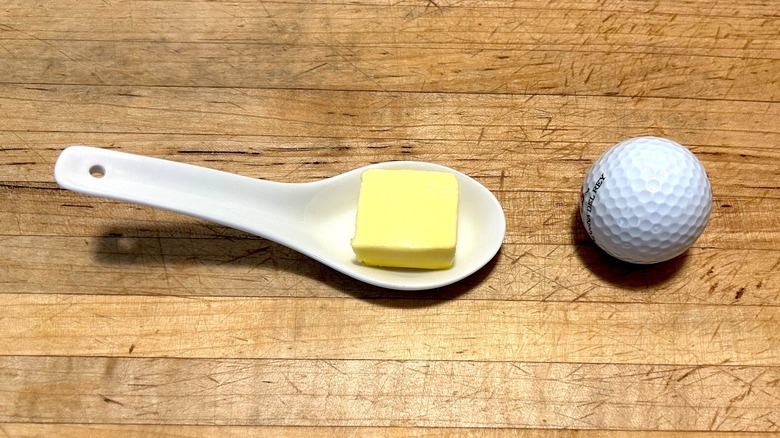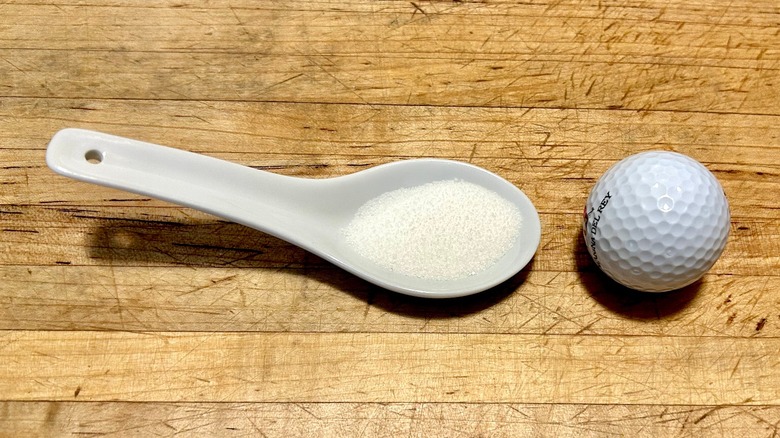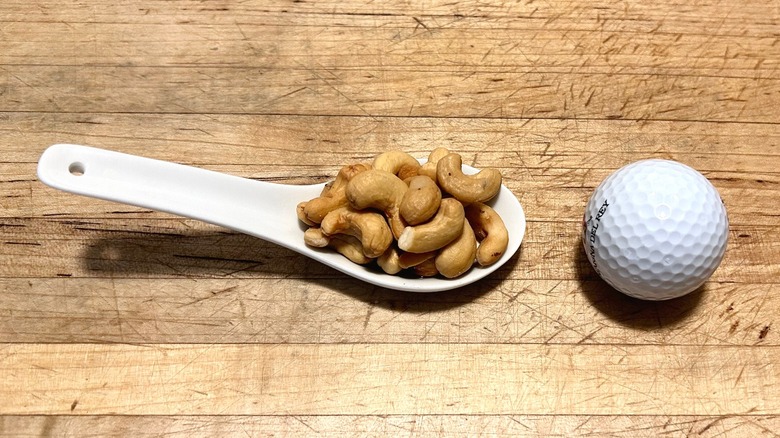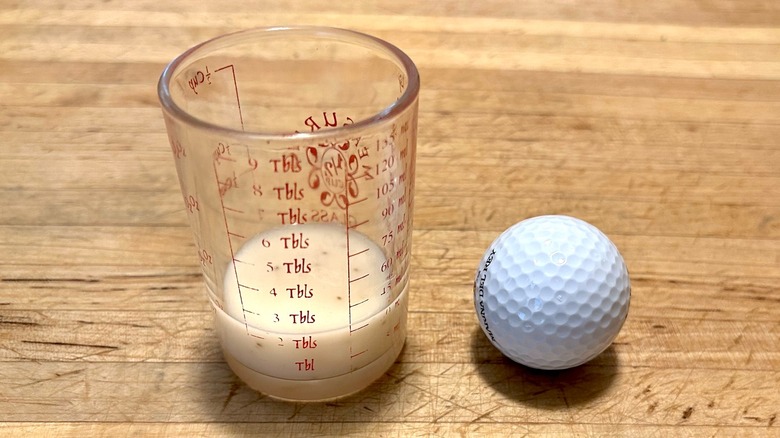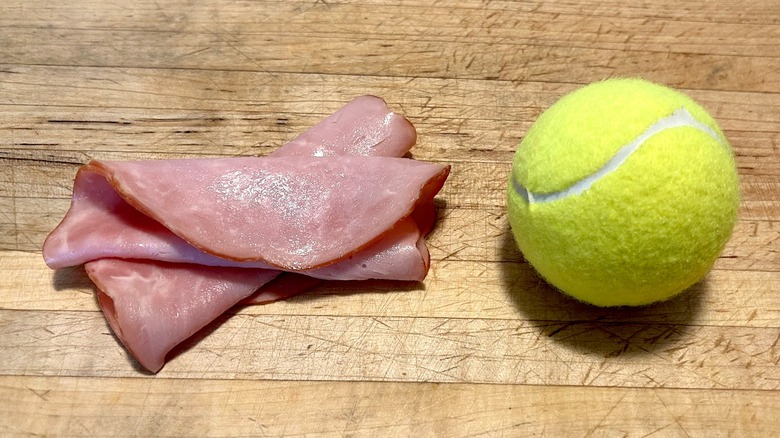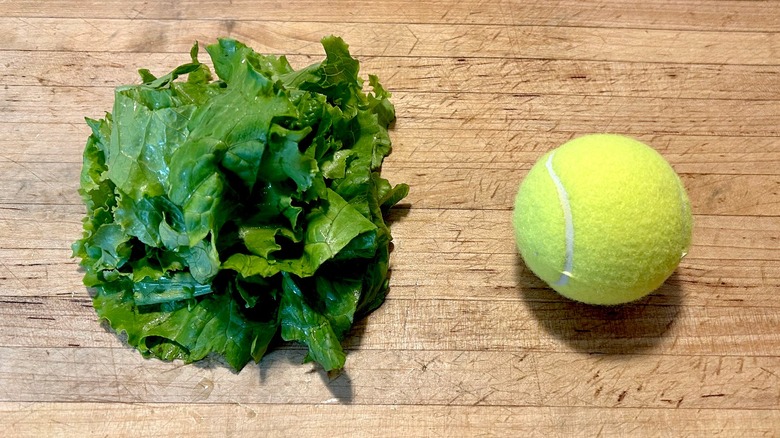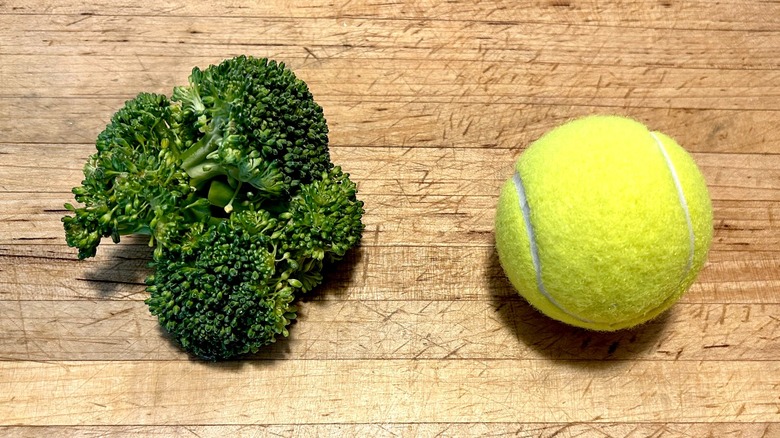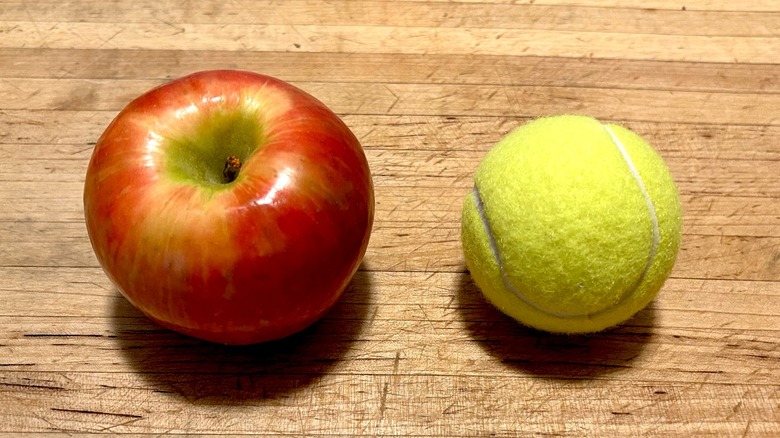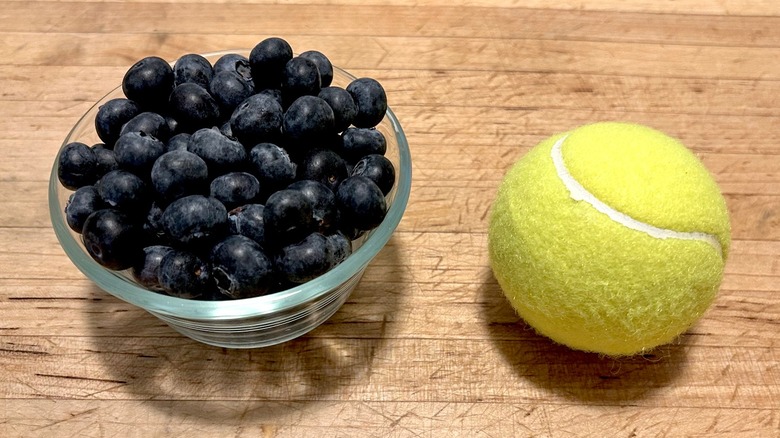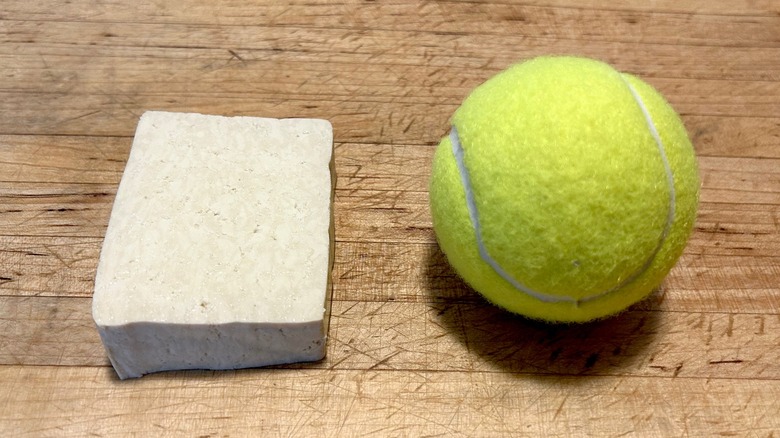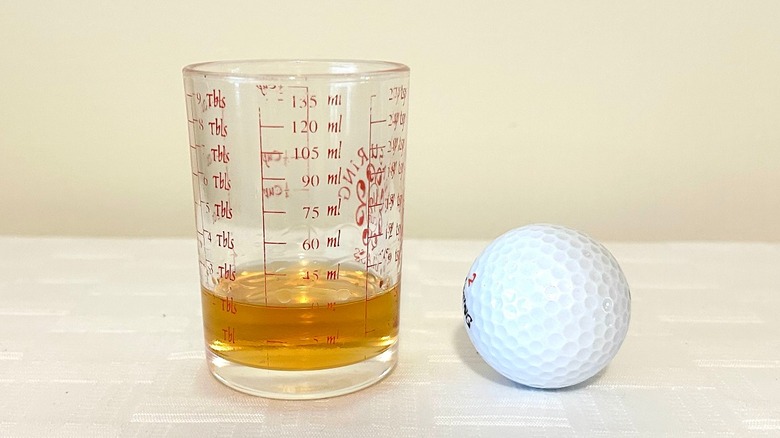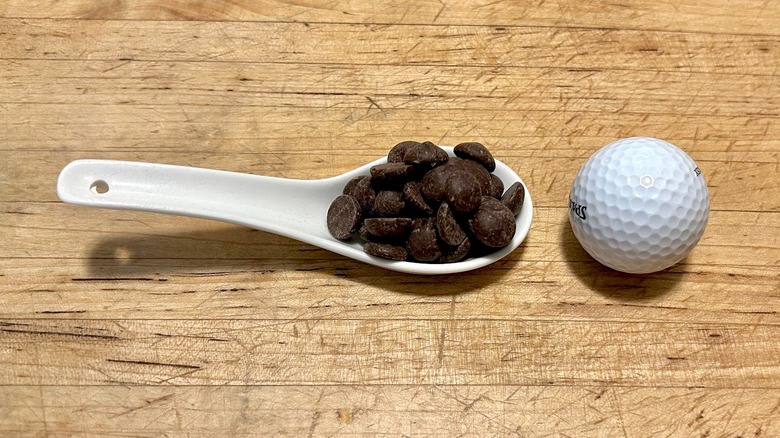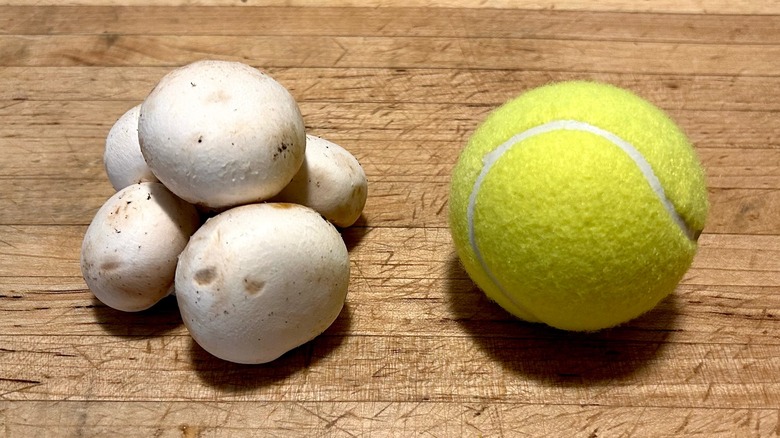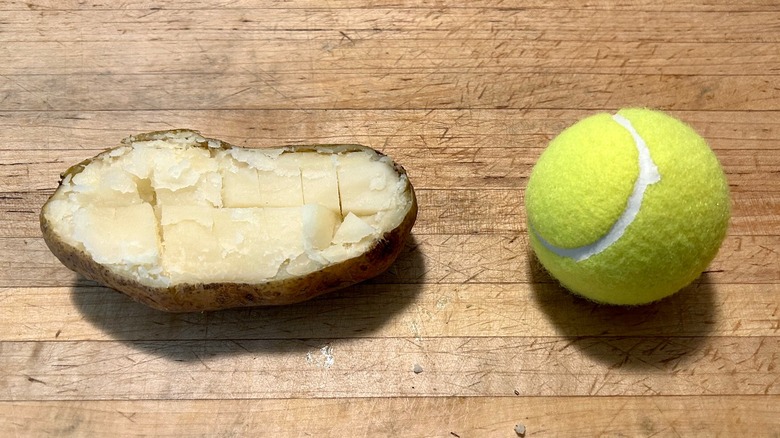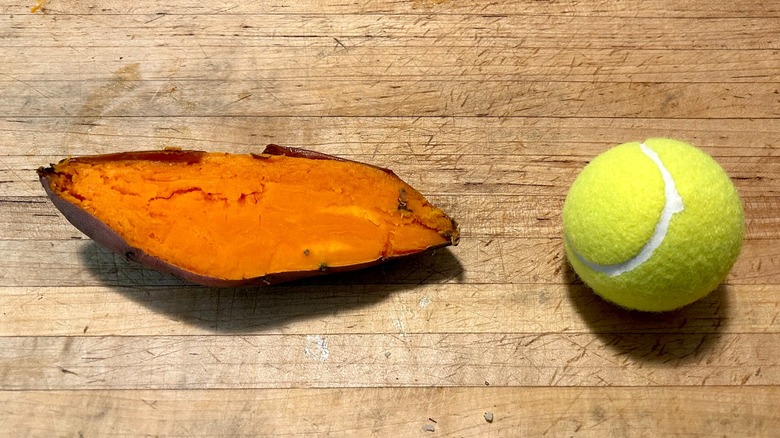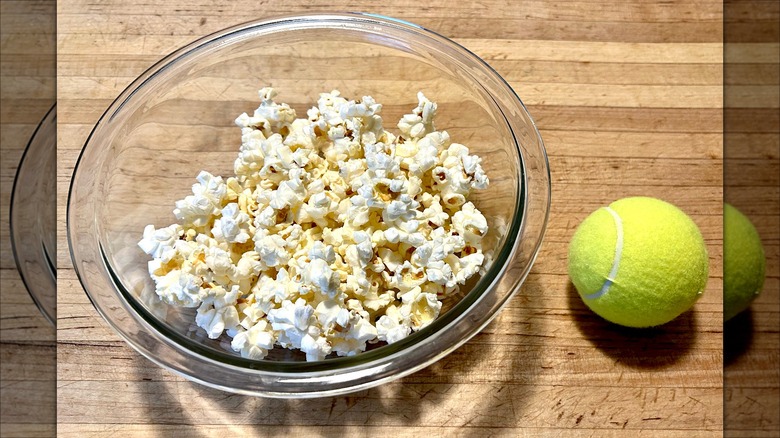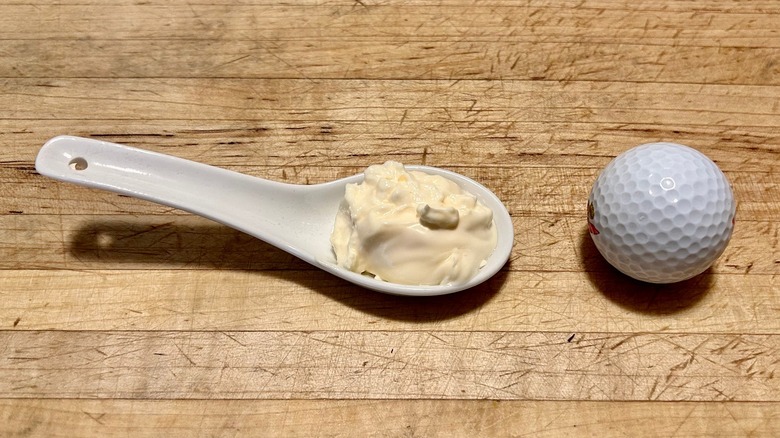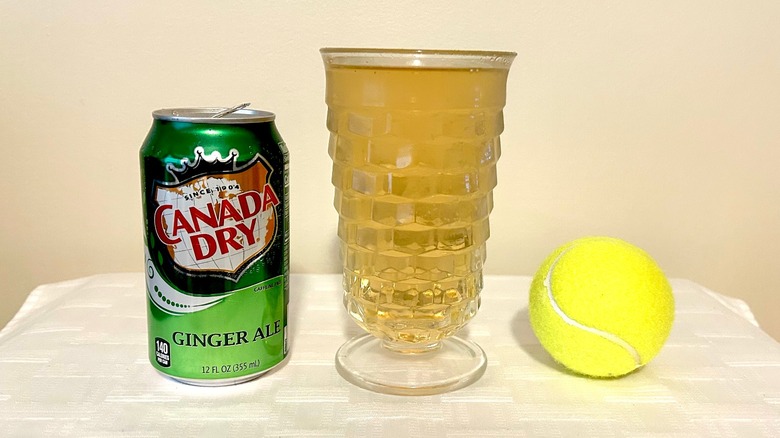This Is What One Serving Looks Like Of 47 Different Foods And Drinks
Understanding serving size is crucial in making informed decisions about what and how much to eat. Doing so, however, isn't always as easy as it may seem. In 2016, the FDA updated the Nutrition Facts Label to more clearly reflect the nutrients for a specific serving size of a packaged food item based on a 2,000-calorie-per-day diet. A primary change to these labels was to more clearly indicate the serving size with a larger, bolder font.
Why such a focus on serving size? As it turns out, it is common for food manufacturers to list serving sizes based on a far smaller portion than what consumers generally eat of a particular product. This can create confusion surrounding how healthy a food is, which may cause someone to overindulge.
We determined what one serving of each food item was based upon the manufacturer or USDA recommendations and measured these carefully. Where possible, we opted for weight versus volume measurements to more accurately reflect the appropriate serving size, as this can vary widely depending upon the food item. We then placed the correct serving size next to a golf or tennis ball for reference to help provide a visual aid that might take some of the guesswork out of figuring out how much of the food or drink to consume. Read on to see what one serving looks like of 47 different foods and drinks.
1. Cereal
Cereals vary widely in terms of nutrition, including serving size. In this case, we opted for plain Cheerios. A 1-cup or 28-gram serving of Cheerios is 104 calories.
This contains 1.85 grams of fat, 20.5 grams of carbohydrates, 139 milligrams of sodium, 2.83 grams of fiber, 1.26 grams of sugar, and 3.47 grams of protein. Cheerios are also particularly rich in several nutrients, including iron, zinc, and vitamin B12.
2. Milk
Milk is available in varieties that contain different percentages of fat. For this comparison, we used 1% (low-fat) milk. A 1-cup or 244-gram serving of 1% milk contains 102 calories. It also has 2.37 grams of fat, 12.2 grams of carbohydrates, 107 milligrams of sodium, no fiber, 12.7 grams of sugar, and 8.22 grams of protein.
Milk is also rich in several vitamins and minerals, including vitamin B12, riboflavin, phosphorus, and, notably, a type of calcium readily absorbed in the human body. Some milk products are fortified with vitamin D.
3. Cottage cheese
Cottage cheese is another dairy product available in various fat percentages. We used 1% (low-fat) cottage cheese, which contains 81.4 calories per 1/2-cup or 113-gram serving. It also has 1.15 grams of fat, 3.07 grams of carbohydrates, 459 milligrams of sodium, no fiber, 3.07 grams of sugar, and 14 grams of protein.
This nutrient-dense food is packed with B vitamins, phosphorus, selenium, and readily absorbed calcium. Most importantly, up to 70% of the calories in cottage cheese are protein.
4. Yogurt
Yogurt is a food that comes in myriad varieties, many of which are loaded with sugar. For our analysis, we used plain, low-fat Greek yogurt. A 3.5-ounce or 100-gram serving contains 73 calories. There are also 1.92 grams of fat, 3.94 grams of carbohydrates, 34 milligrams of sodium, no fiber, 3.56 grams of sugar, and 9.95 grams of protein.
Besides being protein and nutrient-dense, containing vitamin B12, phosphorus, riboflavin, and readily-absorbed calcium, yogurt is a powerhouse in the probiotic department, as noted by the Cleveland Clinic. Probiotics have been linked with improved digestive health, cholesterol management, and boosting immunity.
5. Cheese
Cheese is one of the foods that shocked us when we looked at what a serving size should be. A single serving of pepper jack cheese is 1 ounce or 28 grams. Each serving has 100 calories, 8 grams of fat, no carbohydrates, 170 milligrams of sodium, no fiber, no sugar, and 7 grams of protein.
In addition to a decent amount of protein, pepper jack is a good source of readily absorbed calcium, with 209 milligrams per serving, 15% of the recommended daily value. It may also be digestible for those who are lactose intolerant, as noted by Verwell Fit.
6. Grapes
One cup or 151 grams of red, seedless grapes is 104 calories. This includes 0.2 grams of fat, 27.3 grams of carbohydrates, 3.02 milligrams of sodium, 1.36 grams of fiber, 23.4 grams of sugar, and 1.09 grams of protein.
Grapes also include copper, vitamin K, and myriad B vitamins. The fruit is known for its purported anti-inflammatory, antioxidant, anti-microbial, and anti-cancer properties, per Food and Nutrition Research.
7. Olives
Olive types and serving sizes appear to vary depending on where you search. We opted for pitted kalamata olives. Based on USDA data, we considered a serving size of 30 grams, which equaled about seven smaller-sized kalamatas. This serving has 70 calories, 5 grams of fat, 4 grams of carbohydrates, 640 milligrams of sodium, 2 grams of fiber, and 4 grams of protein.
Though olives are a high-fat food, they are loaded with antioxidants. They are also high in oleic acid, a monounsaturated fat linked with lowering the risk of heart disease, staving off cancer, and brightening skin, per a 2023 review in Nutrients.
8. Tomatoes
Tomatoes also vary by size, color, and type. As a general rule, one medium-sized tomato that is roughly 2 ⅗" in diameter and 123 grams is 22.1 calories. It also has 0.2 grams of fat, 4.78 grams of carbohydrates, 6.15 milligrams of sodium, 1.48 grams of fiber, 3.24 grams of sugar, and 1.08 grams of protein.
In addition to being good sources of vitamins C, K, and potassium, a research article in Skin Pharmocology and Physiology notes that these fruits are lauded for their phytonutrient content, particularly lycopene. Lycopene has been linked with reducing prostate cancer risk and promoting heart health.
9. Carrots
While baby carrots are not juvenile iterations of this vegetable, they are convenient snacks to have on hand. A single serving of half a dozen, approximately 85 grams, has 29.8 calories. They also have 0.1 grams of fat, 7 grams of carbohydrates, 66.3 milligrams of sodium, 2.46 grams of fiber, 4.05 grams of sugar, and 0.5 grams of protein.
Baby carrots are a great source of vitamins A and K and the antioxidant beta carotene. As noted by the National Library of Medicine, beta-carotene may help boost immunity, prevent cancer, and promote dental health.
10. Celery
Celery may seem like a watery, fibrous vegetable without much substance, but it is nutritious. A single 1-cup or 101-gram serving of chopped celery has just 14 calories. This includes 0.1 grams of fat, 2.97 grams of carbohydrates, 80 milligrams of sodium, 1.6 grams of fiber, 1.34 grams of sugar, and 0.69 grams of protein.
Even though celery is a lower-calorie food, it is rife with micronutrients, including potassium, folate, choline, fluoride, and vitamins A and K. Eating celery may help regulate blood sugar, maintain heart health, and support healthy eyes, as noted by the National Institutes of Health
11. Crackers
Crackers are great for dipping, but not all are created equally. While several low-calorie, gluten-free crackers exist, for the sake of this round-up, we decided to use classic Wheat Thins as our choice. It's easy to mindlessly consume handfuls, which is why knowing the serving size matters.
One serving of Wheat Thins is 16 crackers. This contains 140 calories, 5 grams of fat, 22 grams of carbohydrates, 200 milligrams of sodium, 2.6 grams of fiber, 5 grams of sugar, and 2 grams of protein. Substantial quantities of sugar and sodium make these crackers something to consume sparingly.
12. Tortilla chips
Tortilla chips are the perfect snack for dipping but like crackers, serving size matters. Most white corn tortilla chips are similar in nutrition. We opted for Tostitos Original Restaurant Style for this comparison.
A single serving is 28 grams or about seven chips. Each serving has 140 calories, 7 grams of fat, 19 grams of carbohydrates, 115 milligrams of sodium, no added sugars, 1 gram of fiber, and 2 grams of protein. While tortilla chips are not a valuable source of nutrients, they can be a part of a healthy diet when eaten in moderation.
13. Potato chips
Potato chips are delicious salty snacks that vary in nutrition depending on whether they are baked or fried and how much salt is added. For our sampling, we used Lay's Wavy Lightly Salted Original flavor. Each 1-ounce serving is approximately 11 chips, far less than most of us eat in one sitting.
This meager serving has 160 calories, 10 grams of fat, 15 grams of carbohydrates, 70 milligrams of sodium, less than a gram of sugar, 1 gram of fiber, and 2 grams of protein. Unlike other potato chip varieties, these aren't high in sodium but have a high fat content.
14. Hard-boiled egg
Hard-boiled eggs are an easy, high-protein snack to have on hand. One large hard-boiled egg has 77.5 calories, 5.3 grams of fat, 0.5 grams of carbohydrates, 62 milligrams of sodium, 0.5 grams of sugar, no fiber, and 6.3 grams of protein.
Hard-boiled eggs are abundant sources of vitamins and minerals, including iron, choline, and carotenoids, states WebMD. They also contain lutein and zeaxanthin, antioxidants linked with bolstering eye health. Consuming eggs hard-boiled versus poached or over-easy may prevent contamination by salmonella.
15. Cooked chicken breast
Chicken is considered a good quality lean protein source, particularly breast meat. What may surprise you is what a serving size of chicken looks like. The USDA recommends a 3.5-ounce or 100-gram portion of boneless, skinless chicken breast. This has 165 calories, 3.57 grams of fat, no carbohydrates, no fiber, no sugar, 74 milligrams of sodium, and 31 grams of protein.
The way you cook chicken matters as much as how much you consume. Baking, poaching, roasting, grilling, or steaming without added fat are the best ways to prepare nutritious chicken.
16. Wine
A serving of wine is 5 fluid ounces or 147 grams. For red wine, each serving has 125 calories, no fat, 3.84 grams of carbohydrates, no fiber, 0.9 grams of sugar, 5.88 milligrams of sodium, and 0.1 grams of protein.
The nutritional values of wine depend upon the type of grape and the vintner. Generally, red wine is marginally better for you than white wine, having higher levels of select vitamins and minerals, as noted by the Journal of Molecular and Cellular Cardiology. In moderation, red wine has been purported to reduce the risk of heart disease, stroke, and certain kinds of cancer.
17. Sweet corn
Fresh sweet corn is nutrient-dense. A 1-cup or 149-gram serving of sweet corn has 143 calories, 2.24 grams of fat, 31.3 grams of carbohydrates, 3.58 grams of fiber, 6.76 grams of sugar, 1.49 milligrams of sodium, and 5.08 grams of protein.
Corn contains antioxidants like lutein and zeaxanthin, which may help improve eye health, and high fiber content may aid in healthy digestion, lowering the risk of heart disease and preventing certain cancers, per a study in Nutrients. The key is moderation, particularly for those needing to regulate blood sugar, as corn is a high-glycemic food.
18. Frozen spinach
Frozen spinach is quick and easy to use. It also is highly nutritious. A 10-ounce package, or one serving, contains 82 calories. It also has 1.6 grams of fat, 12 grams of carbohydrates, 8.2 grams of fiber, 1.8 grams of sugar, 210 milligrams of sodium, and 10.3 grams of protein.
As noted by Livestrong, frozen spinach may be higher in some nutrients than fresh spinach. It is particularly rich in vitamins A and C, calcium, and iron. Popeye was clearly onto something.
19. Pasta
Pasta in moderation isn't a bad idea. A 1-cup packed or 151-gram serving of enriched spaghetti has 239 calories. It also contains 1.4 grams of fat, 46.7 grams of carbohydrates, 2.72 grams of fiber, 0.8 grams of sugar, 1.51 milligrams of sodium, and 8.76 grams of protein.
There may be some benefit to consuming whole-grain pasta versus enriched pasta because it is higher in fiber and micronutrients and lower in carbohydrates and calories, the jury is still out. If you need to monitor your blood sugar levels, your serving size of pasta matters as it is a high-glycemic food source.
20. Brown rice
Rice is a staple of the diets of civilizations across the globe. While brown and white rice may be part of a healthy diet in moderation, brown rice is marginally better for you due to higher levels of fiber, manganese, selenium, magnesium, and folate.
A ⅓-cup serving of cooked brown rice contains 82 calories. It also has 0.65 grams of fat, 17.05 grams of carbohydrates, 1.1 grams of fiber, 0.16 grams of sugar, 3 milligrams of sodium, and 1.83 grams of protein. Both brown and white rice are high glycemic foods that can adversely influence blood sugar levels in high quantities, as noted by Healthline.
21. Ice cream
Myriad different ice cream brands and flavors are available in the market today. While we used pumpkin ice cream here, but the nutritional content is consistent with regular vanilla ice cream.
A 1/2 cup or 65 grams of regular vanilla ice cream has 140 calories. It also has 7.02 grams of fat, 17 grams of carbohydrates, no fiber, 14 grams of sugar, 50 milligrams of sodium, and 2 grams of protein. Because ice cream is a calorie and sugar-dense food, the best rule of thumb is to monitor serving size.
22. Avocado
A single serving of half an avocado, roughly 100 grams, contains 160 calories. It also has 14.7 grams of fat, 8.53 grams of carbohydrates, 6.7 grams of fiber, 0.66 grams of sugar, 7 milligrams of sodium, and 2 grams of protein.
While the fat content of avocados is high, most of these are monounsaturated. A review in the British Journal of Pharmacology shows that monounsaturated fats have been linked with reducing "bad" cholesterol, which may improve heart health. They are also high in fiber and low-glycemic, which may help with weight management and blood sugar regulation.
23. Hummus
There is a reason why hummus is a staple among cultures across North Africa and the Middle East. A 2-tablespoon serving contains 71.2 calories. It also has 5.34 grams of fat, 5.5 grams of carbohydrates, 1.6 grams of fiber, 0.18 grams of sugar, 127.8 milligrams of sodium, and 2.34 grams of protein.
The Institute for Integrative Nutrition indicates that hummus may be associated with myriad health benefits, including anti-inflammatory properties, supporting a healthy heart, and regulating blood sugar. It is also loaded with fiber, manganese, copper, folate, and iron. And dare we say, it is delicious.
24. Bread
As bread goes, type matters when it comes to nutritional value. Whole wheat bread is healthier because it is made without eliminating the bran or germ from the wheat kernel. This increases the overall fiber, iron, and potassium in the bread, which can improve heart health, aid digestion, and help lower your chance of having a stroke, according to a study in the International Journal of Experimental Medicine.
One slice of whole wheat bread, which weighs approximately 43 grams, has 80 calories, no fat, 20 grams of carbohydrates, 3.01 grams of fiber, 4 grams of sugar, 170 milligrams of sodium, and 5 grams of protein.
25. Butter
Because butter is predominantly fat, it has often been considered to be an unhealthy food. Times are changing though. Dietitians are beginning to recognize that as long as serving size is kept to a minimum, butter can be a part of a healthy diet compared with many other fats. It is also particularly rich in fat-soluble vitamins A, D, E, B12, and K2.
A single serving of unsalted butter is 1 tablespoon or 14.2 grams. This has 102 calories, 11.5 grams of fat, negligible carbohydrates, no fiber, negligible sugar, 1.56 milligrams of sodium, and 0.12 grams of protein.
26. Sugar
Sugar is another food that surprised us when we looked at how much is in a single serving. One teaspoon or 4 grams is a single serving of sugar, and it contains 15.4 calories, 0.01 grams of fat, 3.98 grams of carbohydrates, 3.99 grams of sugar, 0.04 milligrams of sodium, no fiber, and no protein.
According to Michigan Medicine at the University of Michigan, because of its lack of nutritional value, sugar is considered to have "empty calories." It is a high glycemic food that is only valuable as a preservative and for providing flavor and texture to foods.
27. Nuts
Nuts are healthy snacks, but they are the perfect example of too much of a good thing backfiring. A single 1-ounce 28.35-gram serving of roasted, unsalted cashews is 163 calories. They have 13.2 grams of fat, 9.27 grams of carbohydrates, 0.85 grams of fiber, 1.42 grams of sugar, 4.54 milligrams of sodium, and 4.34 grams of protein.
Cashews are high in fiber, loaded with heart-healthy unsaturated fats, and have as much protein as an equivalent serving of meat. They also contain copper, magnesium, and manganese. They are a high-calorie food, so eat sparingly and always opt for unsalted nuts.
28. Ranch salad dressing
People think they are doing themselves a favor by eating a "healthy" salad for lunch. They don't realize that the dressing they put on that salad may be sabotaging their attempts at eating healthy. Serving size is the key. While the nutritional value of different salad dressings may vary, many are high in calories, fat, and sodium.
We took a look at full-fat ranch dressing, which has a serving size of 2 tablespoons or 30 grams. This contains 129 calories, 13.4 grams of fat, 1.77 grams of carbohydrates, no fiber, 1.41 grams of sugar, 270 milligrams of sodium, and 0.3 grams of protein.
29. Peanut butter
Peanut butter is an affordable and popular protein source for many individuals. While peanut butter is high in fat, these are predominantly heart-healthy mono- and polyunsaturated varieties. It is also loaded with vitamins and minerals, including folate, potassium, copper, manganese, iron, vitamin E, and B vitamins.
A 2-tablespoon or 32-gram serving has 191 calories. It also has 16.4 grams of fat, 7.14 grams of carbohydrates, 1.6 grams of fiber, 3.36 grams of sugar, 136 milligrams of sodium, and 7.1 grams of protein. Because it is calorie-rich, serving size is crucial.
30. Deli ham
While some types of deli meat may be better for you than others, it is necessary to recognize an appropriate serving size. A 2-ounce or 57-gram serving of deli ham is 69 calories. It generally has 2 grams of fat, 1.5 grams of carbohydrates, no fiber, 1.25 grams of sugar, and 11 grams of protein.
One downside to deli meats is that they are generally high in sodium content. There is also some concern regarding potentially carcinogenic preservatives known as nitrates and nitrites. The key is moderation.
31. Filet mignon
While doctors have warned about consuming too much red meat due to its saturated fat content, some beef can be a part of a healthy diet when consumed in moderation. Beef is a valuable source of iron, zinc, and vitamin B12.
The USDA recommends limiting portion sizes of beef to 3 ounces or 85 grams, which is much smaller than we are accustomed to eating. A single serving of filet mignon has 227 calories, 14.5 grams of fat, no carbohydrates, no fiber, no sugar, 45.9 grams of sodium, and a hefty 22.5 grams of protein.
32. Salmon filet
Several health benefits can be attributed to consuming salmon, particularly wild-caught. Salmon is high in omega-3 fatty acids, which have been linked to improving cardiovascular health and mental well-being, according to Medical News Today. It also has significant amounts of vitamin B12, D, selenium, niacin, and phosphorus.
A single 3-ounce or 85-gram serving of cooked Atlantic salmon has 175 calories, 10.5 grams of fat, no carbohydrates, and 18.79 grams of protein. While wild salmon is marginally higher in nutrients and lower in calories and fat, it is often more expensive.
33. Green leaf lettuce
There are many different types of lettuce, and while some may be more nutritious than others, all are healthy and low in calories. Lettuce contains vitamin A, potassium, and polyphenols, which are antioxidants that may help to combat cardiovascular disease, cancer, and diabetes, per WebMD.
A 1-cup or 36-gram serving of shredded green leaf lettuce contains 5.4 calories. It also has negligible fat, 1.03 grams of carbohydrates, 0.46 grams of fiber, 0.28 grams of sugar, 10.1 milligrams of sodium, and 0.49 grams of protein.
34. Broccoli
Cruciferous vegetables, including broccoli, are nutritional powerhouses. Broccoli is high in fiber, antioxidants, potassium, iron, manganese, folate, and vitamins C and K1. It has been linked with myriad health benefits, including mitigating heart disease, boosting eye health, and preventing cancer, a by-product of sulfur-rich compounds known as isothiocyanates, according to a review in The Proceedings of the Nutrition Society.
Each 1-cup or 90-gram serving has 35.1 calories. It also has 0.3 grams of fat, 5.64 grams of carbohydrates, 2.16 grams of fiber, 1.26 grams of sugar, 32.4 milligrams of sodium, and 2.31 grams of protein.
35. Apple
They say an apple a day keeps the doctor away. We agree. While apples have fair amounts of fiber, potassium, and vitamin C, their superpower lies in numerous antioxidants, including quercetin, catechin, and chlorogenic acid. These have been linked with preventing certain types of cancer, regulating blood sugar levels, and improving cardiovascular health, as noted in the Nutrition Journal.
A medium apple that is 3 inches in diameter and 182 grams has 94.6 calories. It also contains 0.3 grams of fat, 24.1 grams of carbohydrates, 4.37 grams of fiber, 18.9 grams of sugar, 1.82 milligrams of sodium, and 0.47 grams of protein.
36. Blueberries
Blueberries are a good source of manganese and vitamins C, A, and K, but where they truly shine is in their antioxidant content, which is considered the highest of any fruit or vegetable, according to a survey in the Journal of Zhejiang University Science B. These antioxidants can help reduce inflammation in virtually every part of the body, helping to lower blood pressure and reduce cholesterol.
A 1-cup or 148-gram serving of blueberries has 84.4 calories. They also have 0.48 grams of fat, 21.5 grams of carbohydrates, 3.55 grams of fiber, 14.7 grams of sugar, 1.48 milligrams of sodium, and 1.1 grams of protein.
37. Tofu
Tofu is an incredibly nutrient-dense and potentially healthy food. The soy protein is one of the few plant-based foods that contains all nine essential amino acids. It is also rich in iron, potassium, manganese, selenium, phosphorus, magnesium, copper, zinc, and vitamin B. It has been linked with the prevention of coronary heart disease, osteoporosis, and some forms of cancer, as noted by, as noted by the Dana-Farber Cancer Institute.
A three-ounce serving contains just 78 calories. It also has 4 grams of fat, 2 grams of carbohydrates, 0.8 grams of fiber, 0.3 grams of sugar, and 8.7 grams of protein.
38. Whiskey
There are a handful of potential health benefits associated with moderate whiskey consumption, however, there are also dangers associated with excessive alcohol. When you get a visual representation of the serving size for a shot of whiskey, the fine line between healthy and excessive is quite sobering.
A single serving of whiskey is 30 milliliters. Each serving contains 123 calories and negligible amounts of fat, carbohydrates, sugar, sodium, fiber, or protein. While it does have high levels of polyphenol antioxidants associated with reducing "bad" cholesterol and triglycerides, according to a study in the European Journal of Clinical Nutrition, the benefits may not outweigh the potential downfalls of alcohol consumption.
39. Dark chocolate chips
According to Everyday Health, chocolate may have some health benefits if you opt for the dark variety, which has 70 to 85% cocoa solids. Dark chocolate has antioxidant flavonols. These have been linked with improving cardiovascular health and having anti-cancer properties. But even with the dark stuff, moderation is key.
A single serving of dark chocolate is 1 ounce or 28.35 grams. Each serving has 12.1 grams of fat, 13 grams of carbohydrates, 3.09 grams of fiber, 6.8 grams of sugar, 5.67 milligrams of sodium, and 2.21 grams of protein.
40. Mushrooms
Mushrooms are a low-calorie, nutrient-dense food. One cup or 96 grams of whole button mushrooms has just 21.1 calories. They also have 0.32 grams of fat, 3.13 grams of carbohydrates, 0.96 grams of fiber, 1.9 grams of sugar, 4.8 milligrams of sodium, and 2.97 grams of protein.
What makes mushrooms unique is their high antioxidant levels, which include polyphenols, polysaccharides, ergothioneine, glutathione, selenium, and vitamin C, as noted in Molecules. These antioxidants may help to prevent heart disease and certain kinds of cancer.
41. Baked potato
A baked potato without toppings can be highly nutritious. Potatoes contain potassium, folate, magnesium, iron, zinc, and vitamins B6 and C. They also have high amounts of essential amino acids and resistant starches, which, as noted in Nutrients, may aid digestion and blood sugar regulation.
While the recommended serving size for a potato is 173 grams, we were hard-pressed to find one that small. We ended up cutting a third of the potato off to obtain the proper weight. This serving size contains 161 calories, 0.2 grams of fat, 37 grams of carbohydrates, 3.8 grams of fiber, and 4.3 grams of protein.
42. Baked sweet potato
Sweet potatoes have healthy amounts of vitamins A, B6, C, potassium, calcium, and magnesium. Their orange-hued meat is also rich in the antioxidant beta-carotene, which can help boost immunity and support healthy eyes, per a review in Antioxidants (Basel, Switzerland).
We had a similar issue with finding a small enough sweet potato to fit the recommended serving size of 150 grams. We ended up cutting the sweet potato in half. This serving size has 142 calories, 0.22 grams of fat, 32.7 grams of carbohydrates, 5.25 grams of fiber, 9.32 grams of sugar, 273 milligrams of sodium, and 3.16 grams of protein.
43. Popcorn
If we are strictly looking at how much food you are getting for a serving, plain air-popped popcorn gives you a lot of bang for your buck. A 3-cup or 24-gram serving has just 93 calories. It also has 1.1 grams of fat, 18.6 grams of carbohydrates, 3.6 grams of fiber, 0.2 grams of sugar, 1.9 milligrams of sodium, and 3 grams of protein.
Popcorn also has modest amounts of vitamins and minerals, including iron, copper, magnesium, phosphorus, potassium, zinc, and assorted B vitamins. It also contains some polyphenol antioxidants, which may reduce inflammation.
44. Mayonnaise
Mayonnaise is another food that gets a bad reputation because it is pure fat. It can, however, be a part of a well-rounded diet if consumed in moderation. In this case, serving size definitely matters.
One tablespoon or 13.8 grams of regular mayonnaise has 93.8 calories. It also contains 10.3 grams of fat, 0.8 grams of carbohydrates, no fiber, 0.8 grams of sugar, 87.6 milligrams of sodium, and 0.13 grams of protein. Low-fat mayonnaise or versions made from alternative oils that contain unsaturated fats are also available.
45. Apple sauce, unsweetened
Applesauce can also be a part of a healthy diet if you choose your variety carefully and look for unsweetened versions as opposed to those with sugar added. It is high in phytochemical antioxidants, which can protect you against heart disease and certain types of cancer. It is also rife with potassium, calcium, magnesium, and vitamins A, C, and B6.
A single serving of apple sauce is 1 cup or 244 grams. This contains 102 calories, 0.2 grams of fat, 27.6 grams of carbohydrates, 2.68 grams of fiber, 22.9 grams of sugar, 4.88 milligrams of sodium, and 0.4 grams of protein.
46. Ginger ale
Most sodas are high in calories and sugar and contain little to no nutritional value, making them "empty calories." While they are tasty, consuming too much can lead to a variety of health issues from dental problems to diabetes.
The nutritional value of soda varies by product and brand. One 12-ounce or 355-milliliter can of Canada Dry ginger ale, for example, contains 138 calories. While this has no protein or fat, it does have 36 grams of carbohydrates, 35 grams of sugar, and 49.7 milligrams of sodium.
47. Orange juice
Orange juice is another beverage that varies widely in nutritional value depending upon brand. Freshly-squeezed juice with no sugar added is always preferred. Additionally, juice with pulp is higher in fiber than that without. Orange juice can be a healthy source of calcium, folate, iron, and vitamins A and C.
One cup, or 248 grams, of orange juice contains 112 calories. It also has 0.49 grams of fat, 25.8 grams of carbohydrates, 0.49 grams of fiber, 20.8 grams of sugar, 2.48 milligrams of sodium, and 1.74 grams of protein.
